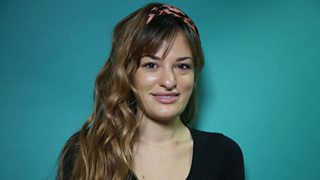How can you help if your child doesn鈥檛 have friends?

As parents, we’ll likely hope that our children will have lots of friends, go to birthday parties and have people to run around the playground with.
But what should you do if they don’t?
Dr Angharad Rudkin, a clinical child psychologist at the University of Southampton, and Tanith Carey, author of The Friendship Maze, discussed this on the Woman’s Hour Parenting Podcast.
Here are their 10 tips for parents.

Tanith Carey’s tips
1. Be a role model to your child
“Be a role model to your child because in the same way that your child copies your accent, they also copy what you do and they watch your social interactions incredibly carefully.
“Don’t just tell your child to be kind, but actually live that kindness. Make it a family value - to treat everybody they come across and that you come across with dignity and consideration. Use that as something you take forward into your lives and actually show them how to do it.”
2. Be your child’s first friend
“You are the person they originally connect with as babies, you are the one that practises with them the to-and-fro of conversation, you are the one that teaches them how to share and also to take turns.
“That relationship with you, and feeling liked and valued, they will take into their own social relationships as they get older.”
3. Make it clear that some social conflict is normal
“We tend to think that when our children come home and say that they’ve had a row with their friends that something must be terribly wrong. But actually whenever children get together...they have different wants and needs and they come into conflict.
“I think the thing is to warn your children that that’s not unusual and to just learn the skills of compromise, negotiation and conflict resolution. Not to take it personally or think they should be ashamed or they’ve done something wrong.”

4. Make sure your child has friends outside of school
“Within the social microcosm of a classroom, it can get really intense and children can get pigeonholed and categorised and put into cliques.
“What I really like to tell parents is to make sure your children have friends outside of school, outside of that intense social pressure where they find they can be valued for who they are, rather than how they fit into those social hierarchies.”
5. Explain the difference between a ‘good’ friend and a ‘bad’ friend
“Even as young children they can be taught the difference between a good friend and a bad friend.
“A good friend is someone who makes them feel good, who lets them play with whoever they like, who they have fun with.
“A bad friend is somebody who makes them feel bad or who stops them from playing with other people or puts them down.
“They can develop that discrimination. It’s also a skill that they can take into their adult relationships.”
Dr Angharad Rudkin’s tips
6. Don’t sweat the small stuff
“When it comes to friendships and life in general, it’s a very long and bumpy ride.
“The important thing is when your children are having a rough time with their friendships, it’s not the end of the world.
“It’s all part of their learning and growing.”

7. Don’t confuse your childhood with theirs
“When we parent, we tend to think about our own childhood and what it was like being parented ourselves.
“With friendships in particular, we tend to lean back on what happened to us as children to help us understand what’s going on for our child.
“But you’ve got to remember that it’s different. It’s a different life, it’s a different time.
“Use your past to help you understand them, but also make sure that you don’t assume what they’re feeling is the same as what you were feeling when you were young.”
8. Social skills are a bit like a muscle
“You’ve got to build up that social muscle by practising every day, especially if you’ve got quite a shy child, or a bit of a withdrawn child. You may need to work extra hard at finding ways of building up that muscle.
“It could be as simple as talking to other dog walkers or it might be chatting to the lady at the till.
“Anything that will help your child practise and build up that social muscle is going to be very valuable.”
9. Stop and listen before reacting
“As parents, we find it very, very tempting to swoop in and make it all better.
“But when it comes to friendships, just listen to your child and understand that none of us are liked by everyone.
“Your child will be liked by some and not liked by others and that’s all part of growing up and being a child.
“Make sure you listen to them and try not to react too quickly.”

10. Let your child make friends with who they wish
“We learn about ourselves through other people and that’s why friendships are so, so crucial to our lives. Both to help us feel better about ourselves, but also helping us build up an identity.
“As a parent, you’ve got to stand to the side and watch your children’s friendships, even if there are some that you don’t particularly agree with, or you’re not quite sure what the impact of that friendship is.
“Just know that this is all part of your child developing their own identity and beginning to understand themselves.”
The Woman's Hour Parenting Podcast is released every Wednesday.
You can listen to it here or download it on the 大象传媒 Sounds app.



